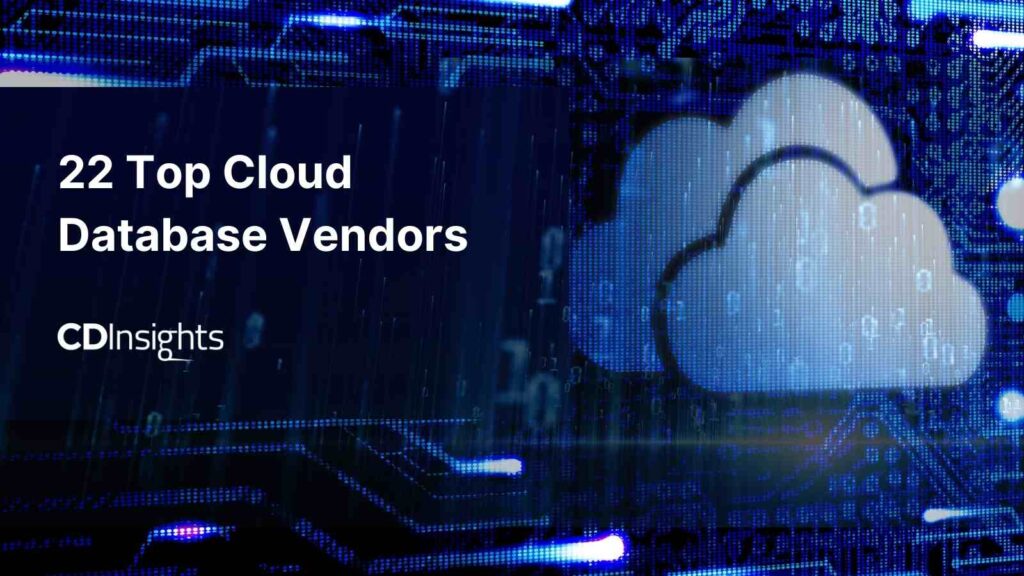
Cloud migration continues to be a priority for many industries and businesses. One big driver for public cloud adoption is lower costs, followed by more straightforward utilization. Public cloud providers have been highly competitive with their service offerings while building the infrastructure businesses need to deploy and run their applications. One particularly popular segment of the market is their cloud database offerings.
Essentially, businesses are moving their traditional database management systems to cloud infrastructure or starting from scratch with new cloud-native database systems. The vendors in this market offer a wide range of features and services. Some of the most important ones include:
Alibaba Cloud
Alibaba Cloud offers a full range of cloud products and services for databases, networking, security, analytics, and more. The services include elastic compute, data storage, relational databases, big-data processing, and content delivery networks (CDN). It is the largest cloud computing company in China, and it has been expanding its presence into Europe and the Americas. It offers cloud databases that support OLTP, NoSQL, OLAP, and more.
Amazon Web Services
Amazon Web Services is the elephant in the room. Amazon’s revenues from its cloud services typically have grown in the double-digit range (usually 20 to 35 percent) year-over-year. AWS offers a broad range of compute services. That includes a wide variety of types of fully-managed database services. In total, AWS offers 15+ purpose-built engines to support diverse data models, including relational, key-value, in-memory, graph, time-series database services, and more. Additionally, the company touts its high availability and security. It delivers those by supporting multi-region, multi-primary replication and by providing full data oversight with multiple levels of security.
BigQuery
BigQuery is a fully managed enterprise data warehouse on Google Cloud that helps manage and analyze data with built-in features like machine learning, geospatial analysis, and business intelligence. It offers great flexibility by separating the compute engine that analyzes data from storage. Companies can store and analyze data within BigQuery or use BigQuery to assess data where it lives. Developers and data scientists can use client libraries with familiar programming, including Python, Java, JavaScript, and Go, as well as BigQuery’s REST API and RPC API to transform and manage data. ODBC and JDBC drivers provide interaction with existing applications, including third-party tools and utilities.
Cloudera
Cloudera offers a hybrid data platform with secure data management and portable cloud-native data analytics to transform complex data into useful insights. Its Cloudera Data Platform (CDP) combines the data management, analytics, and transactional and data science services of public and private clouds. It includes CDP Data Hub, CDP DataFlow, CDP Data Engineering, CDP Operational Database, CDP Data Warehouse, and CDP Machine Learning. Its operational database-as-a-service brings ease of use and flexibility to Apache HBase users.
Cockroach Labs
Cockroach Labs offers CockroachDB, a distributed SQL database for cloud applications. It is built on a transactional and key-value store technology. It scales horizontally; survives disk, machine, rack, and even data center failures with minimal latency disruption and no manual intervention; supports strongly-consistent ACID transactions; and provides an SQL API for querying data. CockroachDB is built to automatically replicate, rebalance, and recover with minimal configuration and operational overhead. It is well suited for applications that require reliable, available, and correct data, and millisecond response times, regardless of scale.
Couchbase
Couchbase offers Couchbase Capella (DBaaS), a distributed NoSQL database offered as a fully managed service. Capella is a JSON document and key-value database with SQL access and built-in full-text search, eventing, and analytics. It offers enterprise-class performance using a memory-first, high-performance architecture. Additionally, Capella guarantees the global reliability of data throughout regions and availability zones via native replication across geo-aware clusters.
Databricks
Databricks is a leading proponent of the lakehouse concept, which combines the capabilities of a data lake and a data warehouse operating on the same data. Specifically, its Databricks Lakehouse Platform combines elements of data lakes and data warehouses to deliver the reliability, strong governance, and performance of data warehouses with the openness, flexibility, and machine learning support of data lakes. The strength of the lakehouse approach is that it simplifies data architecture by eliminating the data silos that traditionally separate analytics, BI, data science, and machine learning.
Related: Top Conferences for Data and AI Professionals Working with the Cloud
DataStax
DataStax offers a massively scalable, highly available, cloud-native NoSQL database built on Apache Cassandra. It offers different solutions. One, Astra DB, is a multi-cloud Database-as-a-Service that simplifies cloud-native Cassandra application development. DataStax Enterprise is a Scale-out, cloud-native NoSQL database built on Apache Cassandra. And its Luna for Apache Cassandra provides those wanting to use the open-source solution with enterprise-class features and support.
The Google Cloud Platform supports many database platform-as-a-service (dbPaaS) products, from fully managed third-party products to its own products. Those products include Google Cloud SQL, Cloud Spanner, Cloud Bigtable, BigQuery, Dataproc, Cloud Firestore, and Firebase Realtime Database. It offers fully managed MySQL, PostgreSQL, and SQL Server databases. And it simplifies migrations to Cloud SQL from MySQL and PostgreSQL with its Database Migration Service. It complements its cloud database offerings with side-by-side data analytics solutions that allow businesses to derive insights from their cloud data.
IBM
IBM offerings center around IBM Cloud Pak for Data, a unified integration layer for containerized DBMS services built on Red Hat OpenShift. Cloud Pak for Data serves as a platform for many other IBM data management offerings, including IBM Db2 on Cloud, IBM Db2 Warehouse on Cloud, IBM Cloud SQL Query, IBM Cloudant, the IBM Cloud Database family, and IBM Event Streams, plus managed services for third-party offerings. In addition to IBM’s DBMS offerings (Db2, Netezza, Cloudant), Cloud Pak for Data also supports third-party offerings like DataStax, MongoDB, Redis, and others.
InterSystems
InterSystems offers InterSystems IRIS, a platform for rapidly developing and deploying data-intensive applications. At the heart of the offering is an ultra-high-performance, multi-model, transactional-analytical database engine. With InterSystems IRIS, data is stored once and can be accessed as tables, objects, documents, key-value, or multidimensional arrays. The solution also features a built-in analytics platform to respond to data in real-time, natural language processing tools to analyze unstructured data, integration and interoperability tools, and automation help for easy deployment.
MariaDB
MariaDB offers MariaDB Server, one of the most popular database servers in the world. It’s made by the original developers of MySQL and is open source. It is a general-purpose, open-source relational database management system. It can be used for high-availability transaction data and analytics as an embedded server, and a wide range of tooling and applications support MariaDB Server. MariaDB Server retains high levels of compatibility with MySQL, and most popular applications that use MySQL will work seamlessly with MariaDB.
Microsoft
Microsoft Azure offers many different cloud database services and services that enhance or work with other cloud database platforms. Among the offerings are Azure Cosmos DB, a fully managed, serverless NoSQL database for high-performance applications, and Azure SQL Database, a fully managed relational database service built for the cloud. Other solutions extend to different database types, including Azure Database for PostgreSQL and for MySQL, which are high-performance, fully managed PostgreSQL and MySQL databases. There are numerous managed instances of other databases, including Azure Managed SQL Instances, Azure Managed Instances for Apache Cassandra, and Azure Database for MariaDB.
Oracle
Oracle offers a line of database services and products that are cost-optimized and high-performance versions of its Oracle Database. Additionally, its Oracle Autonomous Database, available on-premises or in the Oracle Cloud Infrastructure, is a managed, fully automated database service offering. It uses machine-learning–driven automated tuning, scaling, and patching to deliver high performance, availability, and security for OLTP, analytics, batch, and Internet of Things (IoT) workloads. It has numerous other offerings that bring the Oracle database to other platforms or allow it to work with other systems. Some of these offerings include Oracle Database Service for Microsoft Azure, the fully managed Oracle MySQL HeatWave powered by an integrated HeatWave in-memory query accelerator, the cloud document database service Oracle Autonomous JSON Database to develop JSON-centric applications, and more.
Redis
Redis is an open-source, in-memory data structure store that is used as a database, cache, and message broker. It can be run in many environments as a highly-performance scalable distributed data-structure server with advanced NoSQL capabilities. It is well suited for certain scenarios, such as when an organization wants performance and speed over durability, when non-persistent data is used, and more. Additionally, Redis Enterprise Cloud lets companies seamlessly deploy multi-cloud applications.
SAP
SAP is well entrenched in many companies that use its solutions for ERP and other mission-critical applications. On the cloud database front, it offers SAP HANA Cloud, SAP Data Warehouse Cloud, SAP Adaptive Server Enterprise, SAP IQ, and SAP SQL Anywhere. These products are used for operational and analytical DBMS use cases. For analytical use cases, it offers SAP Data Warehouse Cloud for SQL-based development of data warehouses for SAP and non-SAP data. It also offers SAP BW/4HANA, a packaged data warehouse application that can be deployed on-premises and in the cloud.
SingleStore
SingleStore offers SingleStoreDB Cloud, a fully-managed, on-demand cloud database service to power data-intensive applications. It is a distributed, highly-scalable SQL database that can run anywhere. It can ingest data continuously to perform operational analytics for the front lines of your business. Ingest millions of events per second with ACID transactions while simultaneously analyzing billions of rows of data in relational SQL, JSON, geospatial, and full-text search formats. It can be deployed on the AWS, GCP, and Microsoft Azure clouds, as well as on private clouds, IBM Cloud Pak for Data, and Red Hat OpenShift.
Snowflake
Snowflake has taken the market by storm in the last few years. Its Snowflake Data Cloud is a cloud-native platform that eliminates the need for separate data warehouses, data lakes, and data marts, allowing secure data sharing across the organization. It is built on top of the Amazon Web Services, Microsoft Azure, and Google cloud infrastructure. There’s no hardware or software to select, install, configure, or manage. Data can be moved easily into Snowflake using ETL solutions. Additionally, the Snowflake architecture allows storage and compute to scale independently, so companies can use and pay for storage and computation separately.
Related: 27 Cloud Data Vendors to Watch at Snowflake Summit 2022
Teradata
Teradata offers a multi-cloud data platform for enterprise analytics. Its Teradata Vantage offering is a modern analytics cloud architecture that unifies analytics, data lakes, and data warehouses. It combines SQL, ML, graph, multi-model, and federation in a system that can be deployed in multiple public and private clouds plus hybrid architectures. Specifically, it can be deployed on all the major cloud platforms, including Amazon Web Services, Google Cloud, and Microsoft Azure. Additionally, it can be deployed on VMware, IntelliFlex, and other infrastructures.
Other notable cloud database platforms:
- Mark Logic: MarkLogic Server is a multi-model database that has both NoSQL and enterprise data management capabilities. It is deployable in any environment.
- MongoDB: MongoDB Atlas is a multi-cloud data platform that offers an integrated suite of cloud database and data services.
- Neo4j: Neo4j Graph Database is a self-managed, deploy anywhere graph database. The company also offers Neo4j AuraDB, a fully-managed graph database-as-a-service.

Salvatore Salamone is a physicist by training who has been writing about science and information technology for more than 30 years. During that time, he has been a senior or executive editor at many industry-leading publications including High Technology, Network World, Byte Magazine, Data Communications, LAN Times, InternetWeek, Bio-IT World, and Lightwave, The Journal of Fiber Optics. He also is the author of three business technology books.




required data base of elderly people in bnagalore